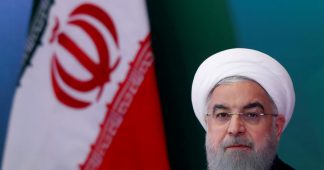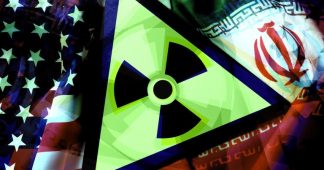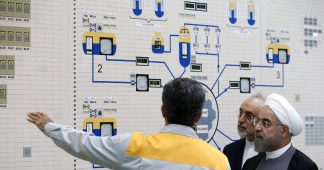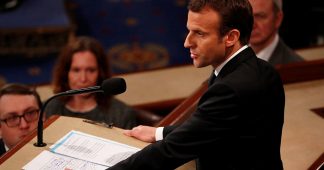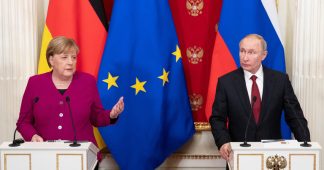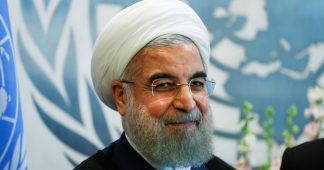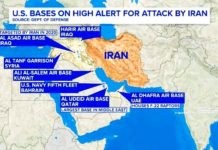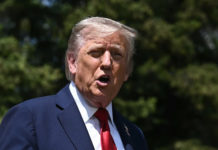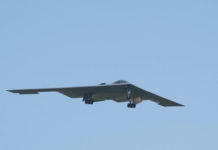By Alex Lantier
15 January 2020
On Tuesday, the foreign ministries in Berlin, London and Paris said they would submit a complaint against Iran for allegedly violating the 2015 Iranian nuclear accord. This would allow them to repudiate the agreement, which Washington abandoned in 2018, and support the reimposition of UN sanctions, aligning them with the US campaign against Iran that threatens to provoke all-out war in the Middle East.
The foreign ministries’ statement is a cynical provocation, defending aggression while claiming to advocate diplomacy. It is silent on the fact that Washington nearly bombed Iran last June after Iran shot down a US drone over its territory, and says nothing about the US drone murder on January 3 of Iranian Gen. Qassem Suleimani in Baghdad. Instead, it denounces Iran’s reactions to these US actions, including Iran’s moves to reduce compliance with the accord, the so-called Joint Comprehensive Plan of Action (JCPOA). In this biased fashion, it brands Iran as a nuclear threat.
“We do not accept the argument that Iran is entitled to reduce compliance with the JCPOA,” it says, citing EU talks with Iran in November and December. “Instead of reversing course, Iran has chosen to further reduce compliance with the JCPOA and announced on 5 January that ‘the Islamic Republic of Iran, in the fifth step in reducing its commitments, discards the last key component of its limitations in the JCPOA,’ which is the ‘limit on the number of centrifuges.’”
The statement charges, without proof, that Iran’s policy has “increasingly severe and non-reversible proliferation implications,” that is, that Iran is attempting to build a nuclear bomb. It asserts, “We have therefore been left with no choice, given Iran’s actions, but to register today our concerns that Iran is not meeting its commitments under the JCPOA and to refer this matter to the Joint Commission under the Dispute Resolution Mechanism, as set out in paragraph 36 of the JCPOA.”
The European claim that Iran is on the verge of building nuclear weapons has no factual foundation. International Atomic Energy Agency (IAEA) inspectors remain in Iran to oversee its nuclear plants. Iran has not repudiated the 1970 nuclear Non-Proliferation Treaty, which it signed. Echoing US actions in the run-up to the illegal US invasion of Iraq in 2003, however, the European powers are effectively dismissing the IAEA inspections and aligning themselves with unsubstantiated US and Israeli government allegations that Iran is close to building a nuclear weapon.
Much of the European powers’ statement is devoted to downplaying the danger of war posed by their policy. They cynically declare that they “regret” the US repudiation of the Iranian nuclear deal. Posturing as advocates of peace, they insist that they “sincerely” want to save the Iranian nuclear treaty as they move to scrap it.
They assert, “We do this in good faith with the overarching objective of preserving the JCPOA and in the sincere hope of finding a way forward to resolve the impasse through constructive diplomatic dialogue, while preserving the agreement and remaining within its framework. In doing so, our three countries are not joining a campaign to implement maximum pressure against Iran. Our hope is to bring Iran back into full compliance with its commitments under the JCPOA.”
This is a pack of lies, directly contradicted by their public calls to be rid of the Iranian nuclear accord and back Trump’s moves against Tehran. Yesterday morning, as the joint foreign ministers’ statement was being prepared for publication, British Prime Minister Boris Johnson appeared on BBC Breakfast TV and asserted that Europe should scrap the JCPOA and support moves to negotiate a “Trump deal” with Iran.
Speaking of the Iranian nuclear agreement, Johnson said, “If we’re going to get rid of it, then we need a replacement. Let’s replace it with the Trump deal.”
Johnson continued, “From the American perspective, it’s a flawed deal… plus it was negotiated by President Obama. Let’s replace it with the Trump deal. That’s what we need to see. President Trump is a great dealmaker by his own account, and by many others. Let’s work together to replace the JCPOA and get the Trump deal instead.”
Trump’s “dealmaking” strategy has involved threatening or carrying out acts of war, such as avowedly murdering top Iranian officials and threatening large-scale air strikes. As such, it is clear that the signatories to yesterday’s joint statement are indeed considering a “maximum pressure” policy—that is, war—against Iran.
The Iranian regime reacted by lamely insisting that it is abiding by the JCPOA and blaming Europe for failing to trade with it after Washington scrapped the accord and imposed sanctions on Iran. The Iranian foreign ministry stated that “after a year, the European side was not successful in fulfilling its obligations and this made Iran reduce its JCPOA commitments in five interval steps taken under sections 26 and 36 of the nuclear deal.” It warned that Europe would face unspecified “consequences” for scrapping the accord.
Moscow flatly condemned the European powers’ statement, effectively rebutting its claim that Europe is “in close consultation” with Russia and China. “We do not rule out that the thoughtless actions of the Europeans could lead to a new escalation around the Iranian nuclear accord,” the Russian foreign ministry said in a statement.
The threats from Washington and the European powers against Iran pose a grave danger of military escalation into a world war. A US-European war with Iran would involve Russia and China even more rapidly and directly than the NATO proxy war launched in Syria in 2011. Only two weeks ago, Russian and Chinese warships were holding joint drills with Iranian warships in the Indian Ocean, in what Tehran claimed was a signal that it could not be militarily isolated from Russia and China, its two nuclear-armed allies.
Nevertheless, Washington and the European powers, apparently emboldened by the Iranian bourgeois regime’s fairly weak response to the US murder of Suleimani, are rapidly escalating. Tehran launched strikes on US bases in Iraq that remarkably caused no casualties, but Iranian officials initially lied, claiming they had killed 80 US troops. The Iranian government also initially denied, falsely, that it had accidentally shot down a Ukrainian jetliner, which it believed to be a hostile warplane. It made no appeal to the enormous opposition to war in the international working class.
The state-run Global Times in China, now the main purchaser of Iranian oil, cited former Chinese ambassador to Iran Hua Liming, who said: “Iran actually had a good hand at the beginning, when the world showed sympathy to it and its people were united by anti-US fury, but it messed up.” Writing that Tehran’s response “seriously damaged the Iranian Revolutionary Guard Corps’ image and credibility among the people,” the Global Times concluded, “Tehran didn’t play it well, and now the situation has turned against itself.”
Georges Malbrunot, a columnist for France’s right-wing daily Le Figaro, for his part concluded that “Iran has been trapped by the strike on Suleimani.” Citing Tehran’s fear of protests erupting over its shoot-down of the Ukrainian jetliner, he claimed that Tehran fears being forced into an all-out confrontation with America earlier than expected: “The American strike came too early for the strategy of Tehran, which was expecting an escalation next summer.”
US officials plan to intensify war operations. At the Hoover Institute in California, US Secretary of State Mike Pompeo said the murder of Suleimani was part of a “bigger strategy” of “establishing deterrence,” including against Russia and China. This came after Trump dispensed with the lie that he had Suleimani murdered for preparing attacks on US embassies, declaring on Monday that “it really doesn’t matter” whether or not Suleimani posed an “immanent” threat.
Pompeo said, “President Trump and those of us in his national security team are reestablishing deterrence, real deterrence, against the Islamic Republic of Iran. Your adversary must understand not only that you have the capacity to impose cost but that you’re in fact willing to do so.” Citing the US withdrawal from the Intermediate-Range Nuclear Forces arms control treaty with Russia, as well as trade war threats and US naval deployments against China, he said, “The importance of deterrence isn’t confined to Iran.”
The European powers’ aggressive policy and the bankruptcy of the Iranian regime’s response underscore that only the independent mobilization of opposition to war in the international working class can halt a new outbreak of even deadlier wars.
Published at https://www.wsws.org/en/articles/2020/01/15/euir-j15.html
